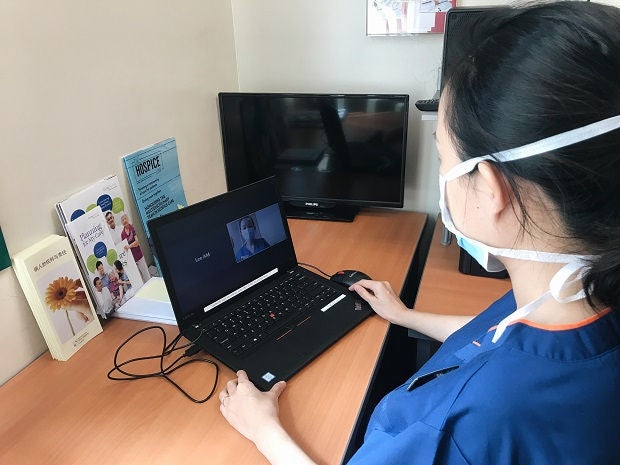
Being diagnosed with cancer often comes with little warning and can turn the world upside down not just for patients, but also their families. Having someone to talk through the multiple emotions one is feeling during this personal crisis can make a big difference.
The team from the Department of Psychosocial Oncology at National Cancer Centre Singapore (NCCS) does just that. Comprising medical social workers and clinical psychologists, the team provides patients and their loved ones with psychological, emotional, and social supportive care throughout the cancer journey.
However, the COVID-19 situation in Singapore presented a new challenge. Face-to-face consultations, which were the way counselling and therapy sessions were conducted, were no longer an option for most patients as a result of the “circuit breaker” measures.
“In this unprecedented time, we find creative ways to reach out and connect with our patients. For instance, we are using video consultations to counsel existing outpatients who meet the criteria and those who are psychologically stable,” said Mrs Tan Yee Pin, who is the Head of Department.
Virtual consultations
Each patient copes in his or her own way and individuals require different types of support at various stages of their cancer journey. Apart from face-to-face sessions, the team now offers patient assessment via video calls to understand the needs of the patients and their family members, and provide the appropriate counselling and therapy.
“We allow our patients to share their experiences and the range of emotions they feel. Normalising their psychological and emotional reactions as an understandable response in a highly stressful time reassures them, as cancer is essentially a journey without a map,” said Mrs Tan, whose team also provides the same services to cancer patients warded at Singapore General Hospital.
Some patients may become more reflective and philosophical during their illness, while others may choose to be practical and carry on with their routines. Whichever the case, the team is trained to assess and journey alongside the patients.
“Video consultations are particularly suitable for Immune-compromised patients who prefer to stay at home during this period to minimise any risk of infection. For those who are unable to engage in video consultations, we conduct the sessions over the phone,” Mrs Tan added.
Relieving anxieties
Face-to-face sessions have not been ruled out altogether during this time, though. They are still held for certain groups of patients.
“Newly diagnosed patients often require more support. We see them to provide information, practical tips, and techniques to manage the worries and anxieties they may have,” said Mrs Tan.
Patients who pose a risk to their personal well-being or safety, or those who need more urgent attention are seen at the clinic. These include patients who may have more complex psychological and social issues, and whose condition may deteriorate without physical consultations.
Patients undergoing treatment already face many anxieties, such as the uncertainties about the outcome of treatment and side effects. During this challenging time, they may experience additional anxiety about their own health and safety.
“Many patients need to continue treatment but are fearful of possibly contracting COVID-19, especially since their immunity is low. We proactively find ways to keep in touch with these vulnerable patients through phone calls and video consultations to ensure their health and well-being is taken care of,” said Mrs Tan.
Her team also reaches out to elderly patients who live alone, those who are physically or mentally dependent on others, as well as patients or their loved ones who have lost their jobs during this difficult period. In addition, the team intends to restart some of their patient support programmes through virtual platforms so that patients can continue getting the care and peer support they need.
Beyond patients, the team is also contributing their expertise to support fellow healthcare professionals during the COVID-19 pandemic.
Mrs Tan-Huang Shuo Mei, Senior Director of Special Projects, SingHealth Staff Care Centre, said that medical social workers, counsellors and psychologists volunteer their time to provide staff counselling and peer support services.
This is part of the SingHealth Staff Care Centre initiative that looks into the mental health and well-being of healthcare professionals, which is especially crucial during crisis periods, such as COVID-19.
Cancer patients who need support can make an appointment with a medical social worker or clinical psychologist via email (psychosocialoncology@nccs.com.sg or patientsupport@nccs.com.sg), or the NCCS appointment line (6436 8088).













 Get it on Google Play
Get it on Google Play